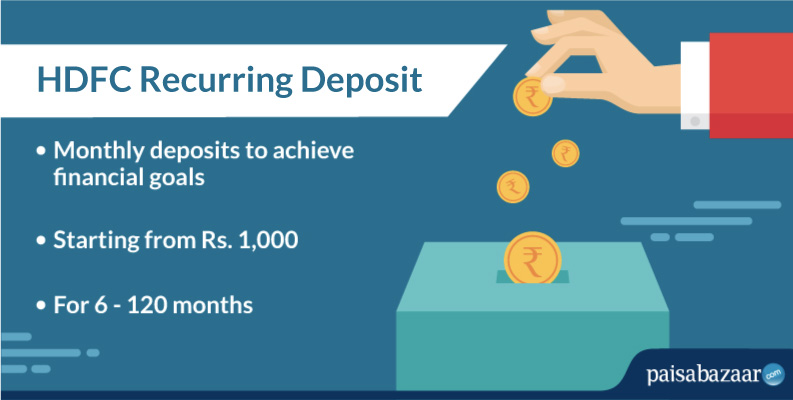Recurring Deposit Account
Samita has a recurring deposit account in a bank of ₹ 2000 per month at the rate of 10% p.a. If she gets ₹ 83100 at the time of maturity, find the total time for which the account was held. Solution: Amount deposited in the account per month = ₹ 2000. Rate of interest = 10%.
- NRE Recurring Deposit Account, maintained in Rupees, is an excellent option for NRIs to make big savings by investing small sums every month. Why choose NRE Recurring Account? The investment per month is not big and you can avail of easy account funding options. Plus, you get full repatriability.
- Manish opens a Recurring Deposit Account with the Bank of Rajasthan and deposits ₹ 600 per.
- A service charge of Rs. 10/- will be levied on Recurring Deposit accounts paid out on or after the date of maturity, wherein there is default in payment of three or more consecutive instalments and the account has not been regularized.
- A recurring deposit is a type of term deposit offered by banks / financial institutes which assist people with regular incomes to deposit a fixed amount every month into their RD account.
When it comes to making safe, regular investments, Recurring Deposits are one of the best options. Here’s all you need to know about them.
The choices in the types of savings instruments available to the public have risen manifold in recent years. However, one investment option that has stayed popular amongst people of all age groups is Recurring Deposit (RD). The main reason for this is that RDs are one of the safest investment instruments available. The following recurring deposit FAQ will resolve some of the most common queries about RD.
What is a Recurring Deposit?

This is a version of a ‘term deposit’ offered by Indian banks. It allows the investors to credit a fixed amount into their Recurring Deposit account on a monthly basis, and earn interest at a rate that varies between 5.25% and 9.50% for a tenure of one year.
The primary benefit of a recurring deposit over an FD is that you can commit to investing a fixed amount every month, whereas an FD relies on a lump sum payment, which many may not be in a position to do regularly.
How does an RD work?
Unlike Fixed Deposit, you can deposit a fixed sum with your Bank or Post Office for a pre-defined term every month. In return, you receive interest at a pre-defined rate, and at the end of the term, the invested capital along with accumulated interest is paid to you.
It is important to remember that, once you start an RD account, the deposit amount and term cannot be altered. Additionally, there are no weekly or quarterly deposit payment options.
What is the amount I can deposit in an RD every month?
Most banks have a minimum deposit amount of Rs. 500, though it can even be as low as Rs. 100. You must also commit to making deposits in multiples of Rs. 500, though some banks may allow deposits in multiples of Rs. 100. It is best to check with your bank what their specific policies are in this regard.
Related:Understanding your savings account

How long is the term of an RD?
Recurring Deposit Account
The minimum period for almost all RDs is 6 months, and this is extendable by multiples of 3 months up to a maximum permissible period of 10 years (120 months). The benefit that RDs offer is that you can define the length of the term. However, once fixed, that period will also serve as a ‘lock-in’ (usually 3 months) for your investment.

What is the interest rate paid on RDs?
This is one of the most common RD FAQ. The interest rate offered on RDs is directly correlated to the prime rate of the Reserve Bank of India (RBI) and is compounded and credited to the account on a quarterly basis. Rates currently range from 5.25% to 9%.
Senior citizens are eligible for an additional interest rate of 0.25% to 0.75% over and above standard interest rate offered by most banks. You must check this rate with your bank before opening an RD account.
Related:Short term investment options for high returns
Can I redeem my RD before the end of its term?
You can stop your deposits at any time and even redeem your investment when you want to. However, you could incur a small penalty (usually 1% of the interest earned) for cancelling your recurring deposit prematurely. This penalty will be defined at the time of opening the RD. However, the principal money invested is not affected under any circumstances.
Do RDs have a nominee/beneficiary facility?

Yes, all such deposits have a nominee or beneficiary assigned to the account. You can also change the nominee at any time by filling in the appropriate paperwork with your bank.
Can an RD be opened for a minor, or as a joint account?
Yes. You can open an RD account for a minor (child below 18 years) and even with someone else, as a joint account.
Does a Recurring Deposit account offer benefits to senior citizens?
The primary benefit to senior citizens is an additional interest rate which varies from 0.25% to 0.75%. This rate is paid to those who have reached or crossed 60 years of age.
Related:Are you making the most of your savings account?
What happens if I delay the monthly deposit payment?
Recurring Deposit Usa
When you open an RD account, you are informed about the maturity value under the assumption that the monthly instalments will be deposited on the due date. A delay of even one day will mean that the interest penalty will apply for the whole month, or there could be a cash penalty that is a proportion of the monthly deposit. Either way, it affects your payout on maturity to some extent.
If you default on your monthly instalments frequently and have six outstanding instalments, some banks reserve the right to close the RD account. The interest rate payable will be as per the premature redemption aspect of the RD agreement.
Can I make partial withdrawals from my RD Account?
No, partial withdrawals are not allowed. Additionally, you cannot ask for periodic payouts of just the interest component. The interest will be paid when the account is either closed prematurely (subject to the early redemption penalty) or on maturity.
What other benefits can you avail of with an RD?

Most banks provide loans of up to 90% of the current deposit value. The interest charged on such loans is also lower than that of a personal loan – usually no more than 1% of the deposit rate the bank is paying on the RD.
This facility comes into its own if the investor requires cash for an emergency, especially since the RD continues to earn interest, and one does not have to pay the penalty for the premature withdrawal of the deposit.
Investors are eligible for tax exemption on Recurring Deposits only if they invest in an RD through India post, and in a 5-year scheme (at least). The maximum taxable deduction, under Section 80C of the Income Tax Act of 1961, is Rs. 1.5 lakh.
Who should invest in RD?
A Recurring Deposit is a good investment option for risk-averse investors as the product offers fixed returns with no risk. It is particularly suited for those who do not have a lump-sum to invest and would rather put money away on a regular basis. Recurring deposits are ideal for people who are looking to meet their short-term goals.
Create A Recurring Deposit
The answers to common queries recurring deposit should make it easier for you decide on the investment. Speak to your bank or local post office to understand the specifics of their service better.
What is a Recurring Deposits Account?
The Recurring deposit account is an account in the bank or in a Post office where a depositor deposits a preset amount of money every month for a fixed time period (generally ranging from one year to five years). This format is meant for persons who would like to deposit a fixed amount every month, with the purpose of getting a lump sum after a few years. The little monthly savings in the Recurring Deposit plan allow the saver to build up an attractive sum on maturity. Interest rate in this kind of deposit scheme is calculable on quarterly compounded based.
How does Recurring Deposits account works?
An average fixed deposit ensures that a person allocates a sum and in a particular period of time, you can withdrawal this amount. Meanwhile, you don’t have access to touch the amount of sum or maybe complement this. The recurring deposit operates over an equivalent process. The main difference in this kind of scheme is instead of depositing a bulk amount you should submit a specified amount in your account, which you decided at the time of opening of your RD account, each month. This amount could be a small amount that can’t blank your pocket much. And at the time of maturity you will have a big amount over your principle amount including the interest.
How to open a Recurring Deposits account
You can open a RD account by visiting any bank/post office and filling up the form, by providing some other formal documents like PAN Card & residential proof that is used for opening an RD and pay the first month’s money to the bank/post office.
One can open a recurring deposit for a period of as less as 6 months or in multiples of 3 months with a highest term of 10 years. The interest rates presented under a Recurring Deposit is alike to the rates given under fixed deposits. If one is a senior citizen, then 0.5% extra rate of interest is granted, similar to India post & some banks also give a facility of grace period as well, which is about to 5 days.
Can you break Recurring Deposit?
Yes, you can break a recurring deposit. The bank/post office cannot decline that. But, the bank/post office has the right to retain/cancel the interest unpaid on it because you are not letting the recurring deposit complete or finish its complete term. You may get the sum you deposited but not any interest.
Advantages of Recurring Deposit are
- Fixed monthly investment.
- Fixed duration.
- Fixed rate of interest.
Disadvantages of Recurring Deposit are
- You cannot withdraw the money anytime you wish.
- You cannot change the amount you like to invest monthly once decided.
- It has a comparatively lower rate of interest.
Nro Recurring Deposit Account
Source:Fintiger.com